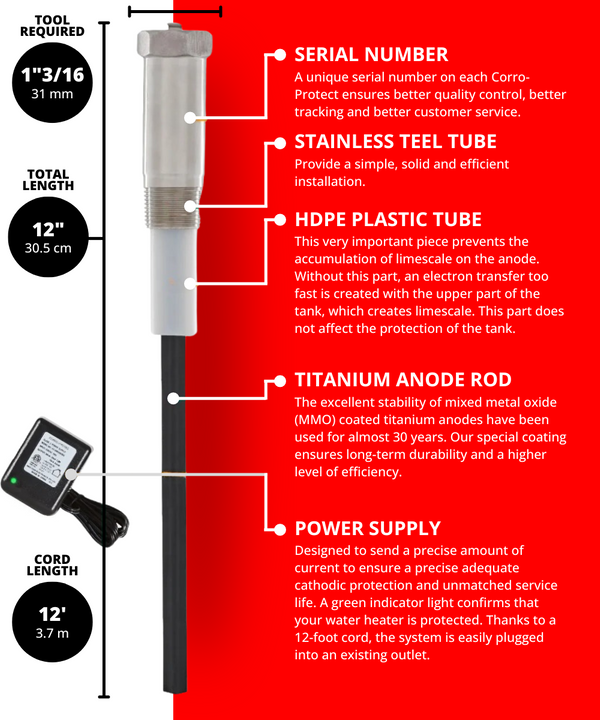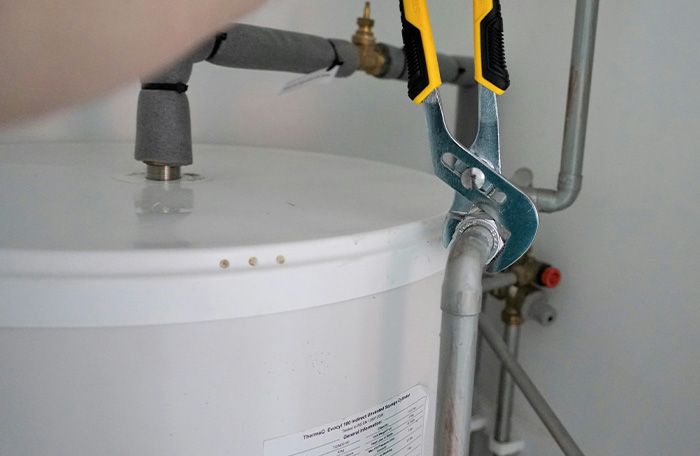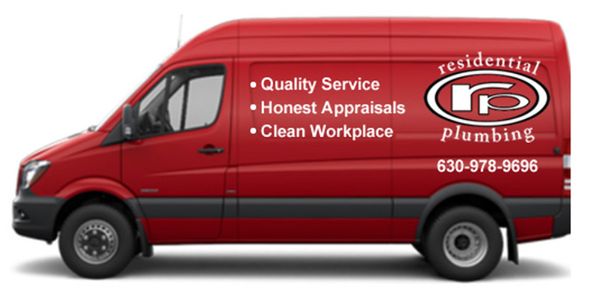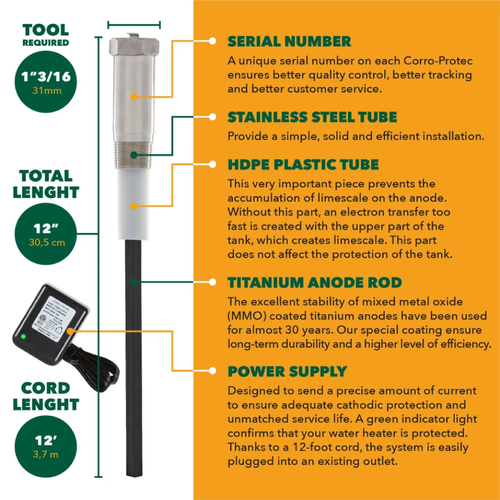Powered Anode Rod
Avoid Water Heater Tank Corrosion With a Powered Anode Rod
If you have a tank water heater, then it’s made from either metal or steel, both of which can corrode when put in constant contact with water and the minerals that are in it. This is a concerning thought, considering a leak in your tank would lead to lots of water on your basement floor and leave your home without warm water for the foreseeable future.
That’s why water heaters are built with glass-like layers on the interior of the tank – to protect the steel or metal from breaking down. Unfortunately, while this layer does a good job protecting the tank walls, it can’t keep it totally safe. Which means your tank is still vulnerable.
So, what else can be done? Cue anode rods.


What Are Anode Rods?
There are two types of anode rods you can use in your water tank. The first is a sacrificial anode rod, which works basically how the name implies. These are long rods made from weaker metals, and they act as a sacrifice by attracting all of those harmful rust-causing minerals (that go for weaker metals first), so that they steer clear of the sides of your tank.
Now, sacrificial anode rods need to be replaced regularly because, once they’re worn down enough, the tank will start facing damage. How long will they last you? Depending on the quality of your water, typically about 3 – 5 years.
Then, there’s the powered anode rods. These don’t break down like a sacrificial anode rod. Rather, they use small electrical pulses to repel or scatter all of those corrosive elements floating around in your water tank. That means anything harmful stays away from both the sides of the tank and the rod itself, enabling them both to stand the test of time.

The Benefits of Powered Anode Rods
Why are many opting for powered anode rods over sacrificial ones?
- They don’t break down and corrode, meaning you won’t need to replace them as often as you would a sacrificial option.
- They actually kill the bacteria that creates that foul rotten-egg smell that water heaters can sometimes produce. So, no foul odors!
- Water quality can differ from home to home, but powered anode rods adjust their electrical pulses to fit your unique needs.
And the disadvantages? Powered anode rods will be more expensive up front than their quicker-corroding counterparts. That said, they last significantly longer, too, which is a huge plus and helps to balance out those initial costs. You’ll also need to remember that these need an outlet nearby (or an extension cord), so they can be plugged in. And if the power goes out, your tank will be without protection temporarily.
How Do I Know If My Sacrificial Anode Rod Needs Replacing?
- Your water heater is making clunking or popping noises. This indicates sediment is starting to build up, and that your anode rod is unable to do its job as effectively.
- You’re experiencing rusty water. If you notice brown or discolored water when running your hot water, it could be that your tank is corroding or rusting.
- Leaks or obvious cracking/corrosion. Again, this indicates your tank is breaking down and that your anode rod isn’t doing its job.
- You notice a foul, rotten egg-type smell. Anode rods help to combat the bacteria that produces this odor, so if it’s prominent, you may be due for a replacement.
- It’s been a few years. If you use a sacrificial anode rod and it’s been about 3 years since you’ve replaced it, it is likely it doesn’t have much service life left.
Our Recommendations for Anode Rods
What our customers are saying

"I was thoroughly impressed by the 2 guys from Residential Plumbing, inc. From their prompt arrival to the transparent pricing, their professionalism was evident throughout. They efficiently resolved the issue, provided valuable insights, and ensured the work was done to a high standard. I highly recommend them!"
- Sucheta A.

"Residential Plumbing provided a great solution to address the short cycling problem I have had with my old sump pump. They didn’t just simply replaced a sump pump. They figured out why my old pump was short cycling and provided a different type of pump that completely fixed the issue. The office staff were very nice and Ken F. was extremely knowledgeable. He explained the issues and proposed his solutions with a reasonable quote. The field technicians were very professional and completed the project nicely. I would recommend them if you have plumbing needs."
- Zijie Z.

"Awesome company! Had a frozen/broken pipe and all other companies were quoting 48 hours. Rob came out after hours and fixed the pipe and got our water back on. Very reasonable on price on top of great service!"
- James B.

Having Other Plumbing Troubles? Reach Out!
Powered anode rods help your home’s water out in lots of ways, but if you’re not wanting to deal with the hassle of them at all, then maybe it’s time to consider upgrading to tankless water heater – our team would be happy to help you out! And we’d love to tackle all of your plumbing-related issues, too, be it leaky pipes, sewer issues, backflow testing, or something else.
Book Online or Give Us a Call
Thanks for putting your trust in us!
If you’re ready to schedule with us, there are a couple of easy ways to do it. You can either call us at (630) 442-1203, or you can get your appointment booked online (after which, we’ll call to confirm).

